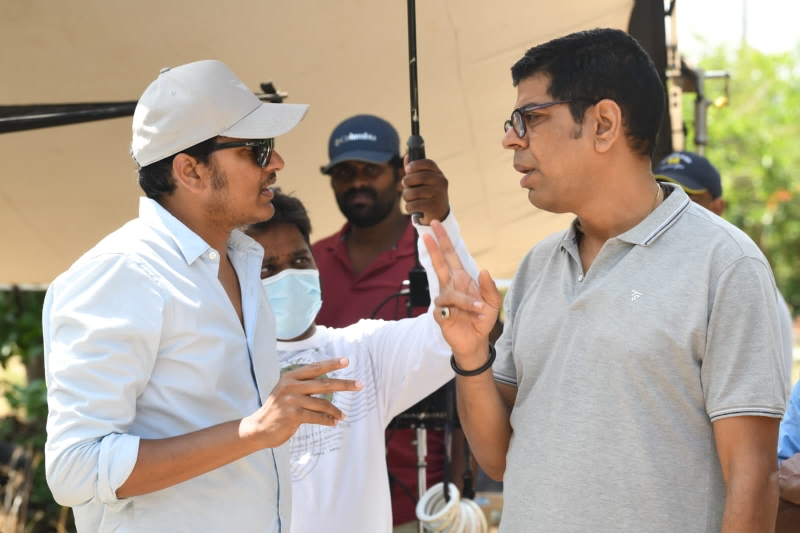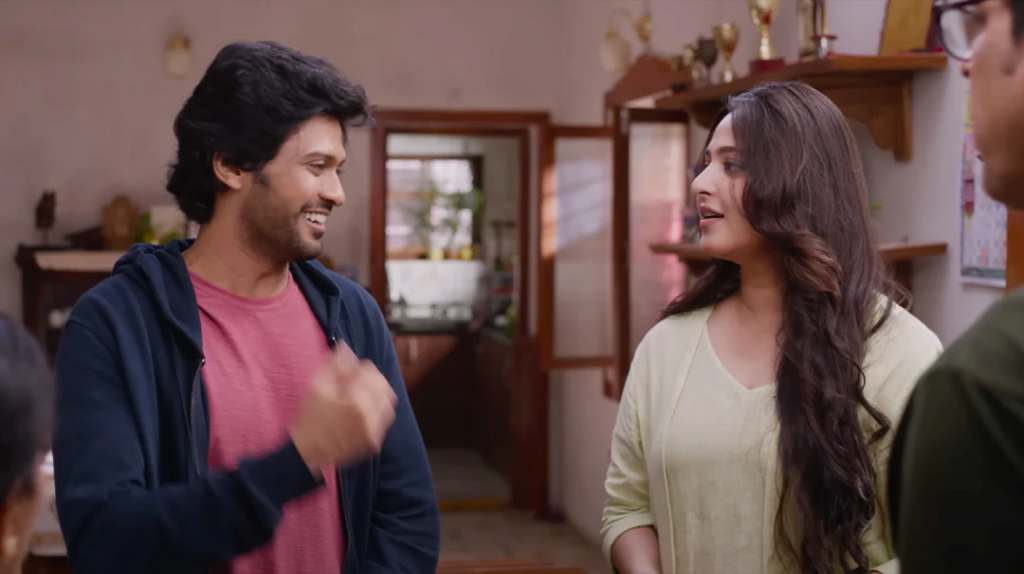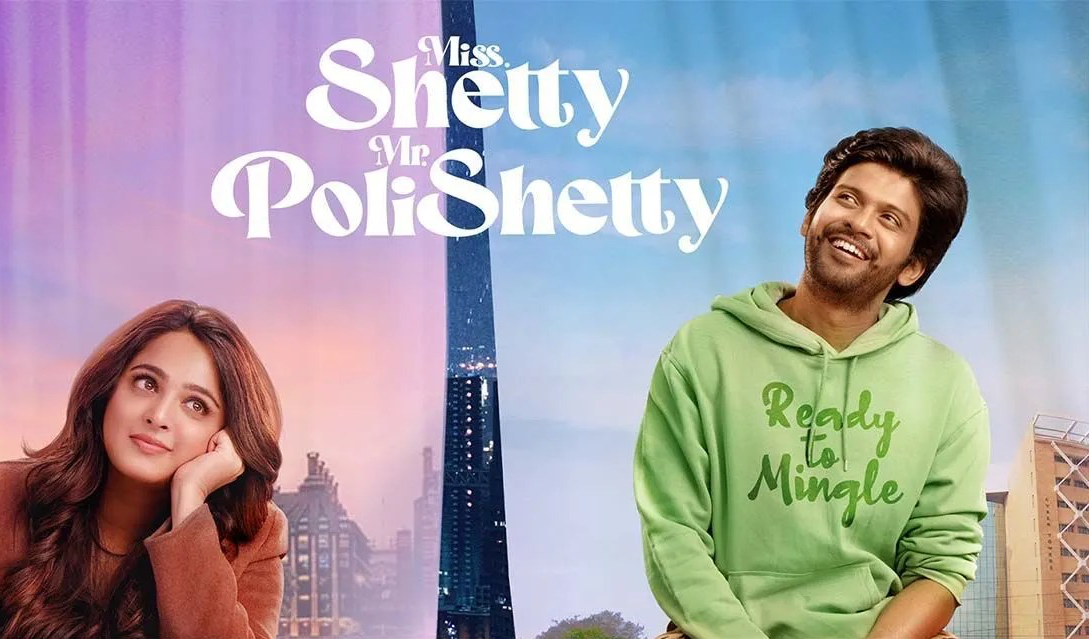3.5/5
Watching Naveen Polishetty since the AIB days, one thing becomes clear: he has a penchant for the screen. As Ms. Shetty Mr. Polishetty (MSMP) extracts, he makes the most innocuous situations sparkle like crazy when performing them on the big screen. There’s an honesty mixed with a layer of spontaneity that can make even the boring entertaining and save a movie from tanking. He is malleable as a leading man, as seen by the clumsy yet intelligent detective and the unfortunate goof he played in his previous movies. Naveen Polishetty is the poster boy of what TFI and TFI entertainment should herald.
At the same time, Anushka has evolved quickly from her initial days as a famous heroine into someone looking for good scripts and roles. It doesn’t always come out, but that attempt to age gracefully rather than to stay confined within the spaces of the commercial heroine (which is well and alive in the quarters of TFI) is commendable and is what has prompted her market of sorts to expand. Although she’s reduced her screen appearances drastically, just seeing her on screen evokes a good feeling of nostalgia and comfort that, potentially, there’s a suitable movie in the offering.
The task of making these two meet has been delayed and uncertain. A project that was supposed to come out close to a year ago hits the screens now with minimal hype solely due to the singlehanded promotions Polishetty has offered. Jawan, a box office behemoth, also looms large in the background. All may have sprung a seed of doubt that this combination won’t get its due.
But what Ms. Shetty Mr. Polishetty (MSMP) does so well is that it makes both Anushka and Naveen part of the soul, but it doesn’t make them the movie itself. Both are fine performers, both in their space, but both are ultimately bound to the main goal: the script. MSMP has its voice and distinct style that it wants to make out. The traditional romantic comedy doesn’t have the most drastic twists, but through that mask, it raises important questions and gently breaks barriers on taboo subjects. It’s subtle throughout without slapping the events squarely on our faces to bring out the beauty. And above all, it’s focused and well structured, going from event to event with minimal fuss or diversions. MSMP is a beautiful watch that keeps the audience aching with laughter, full of sentiment, or just having a good time.
PLOT:
Anvitha (Anushka), a master chef from the UK, based on her mother’s insistence and some untimely events, decides to become a mother herself through IUI, an artificial insemination technique. While she searches for the perfect man to donate sperm, standup comedian Siddhu (Naveen Polishetty) is a happy-go-lucky but loveable guy who catches her eye. The journey they take, the feelings involved, and the various subplots they have with each of the characters around them all make up the core story of MSMP.

WRITING:
Director/writer Mahesh Babu P. does two things in the writing that make it commendable. The first part is that he chalks out a very entertaining romantic comedy, which has become a rarity in Telugu cinema—simple emotions through good subplots, good parallel, Mahesh Babu. P applies the basics in his debut cinema well. MSMP gets the main stuff right as it goes throughout. The plot itself, at the core of it, is a traditional romantic comedy that takes the journey of the life of two individuals. But the USP is that there aren’t any deviations in the screenplay. The screenplay sticks to its strengths and shines through every scene, as each event goes to the next and slowly develops the story systematically from frame one. Every stage contributes to the conflict and prioritizes good storytelling rather than a commercial appeal, something Babu never succumbs to despite it being a debutorial venture.
Despite the various subplots (to be discussed further), MSMP is a romantic comedy- so both the romance and the humor need to be done well. While the romance blooms typically after letting us understand the separate characters and their motivations, the comedy is written exceptionally well. Situationally, the punches come at a steady stream, and 90% rely on Polishetty’s brilliance to give the final icing, which he does in abundance to light the screen up in so many scenes. From the standup comedy, it’s clear that the makers have done their HW; the jokes are funny and flow authentically to envelop us more into the world. There’s been many a movie that fails to bring out this angle effectively; immediately, MEB comes to mind. MSMP never makes that mistake and extends its authenticity through simple actions. When Polishetty goes through the standup acts, the movie tries to show the audience his interactions with them, akin to a real standup comedy. Small stuff goes a long way.
The second thing, however, is the attempt to discuss taboo topics in the mask of a familiar template, here being sperm donation. We’ve seen many movies on the subject, but in TFI, initially, many need to go forward in this topic. Not only is this well-intentioned, but it is also well-written. Babu emphasizes a relatively smooth transition into this topic with self-referential humor and a more familiar setup to slowly introduce the audience to a somewhat taboo subject throughout the movie. As the proceedings go along, the film never lets go of this plot element or makes it crass at any point. Using the surroundings, apart from the character of Polishetty, the movie makes a small but significant effort to chip down at barriers for an audience. Above all, cinematically, it adds freshness to a done-to-death template. Hence, when the plot is looked at, despite the cover of a romantic comedy, there is something fresh that hasn’t been explored before. As a writer, Babu hits two birds with one stone.
MSMP’s faithfulness and attempts to broaden mindsets aside, from a writing perspective, many more things work so well to hold its coherence as a movie. For one, the writing is always subtle. It never tries to press anything after a certain point, whether it be the romance, the comedy, the message, or emotions. Babu’s writing is always grounded and mature in the events that it approaches. An overemphasis on events could have sent this movie running to the ground, but Babu lets the film play out as it would in real life for the most part.
Sample this: In a beautiful arc, Siddhu and his father are always at loggerheads until a certain point in the movie, which is expected considering the template. But Babu approaches this without more emphasis; Siddhu’s father comes to him, brings out a paper, and coolly asks for his autograph. Amidst the flurry of emotions, Siddhu walks in the rain with his dad, who talks to him for the first time like a friend. Written beautifully, their relationship’s turning point is predictable but never routine. The writing lets everything sparkle, a mature take refreshing to see.
The writing scores again with its use of characters. Anvitha and Siddhu are two individuals that are at loggerheads and make questionable decisions, but the film never takes sides in certainty. Anvitha as a character has her backstory, touched upon poignantly, for why she is, and her evolution as a character happens according to the story. Siddhu is a passionate individual who lets his personality shine, making him inherently likable. But he relies much on emotions, falling in love with Anvitha, but that reliance doesn’t take a step back to think about where the other person is coming from. This is used for comedy, emotion, and character development.
Babu’s writing doesn’t leave it there. The characters around them are developed to a reasonable extent too. Jayasudha in a 10 minute role gets her best part in a while that spells out her personality for us. The dynamic Siddhu shares with his family, especially his father is brought out with touching parallels that help the movie rise a cut above the rest. Nasser’s role as the lovable restaurant manager develops a father-like relation with Anvitha, something the writing could have developed more but leaves it as a sweet interaction. Siddhu and his office, Siddhu and his friend Rahul (Abhinav Gomatham), there interactions give the movie its heart repeatedly without falling prey to a template.
The only character that got the short end is Kavya, Anvitha’s friend; the dialogues pale out and the acting is subpar, leading to something to be desired. Additionally, I thought some portions could have been written a bit better. The first 10 minutes of the movie establishes the movie well, but templates its setup in rushing the events that form the crux of the rest of the movie. Siddhu’s transformation initially could have been a bit more fleshed out in the second half, and of course with this template, the relatively low share of cliche scenes make an impact. Some jokes don’t land too well, which is fine in the grander scheme.
But it truly doesn’t matter when the writing is sensitive to its surroundings, doesn’t try to overplace anything, and respects the template rather than trying to frame it as something its not. Authenticity yells loud and clear from the get-go, and this authenticity gives MSMP’s writing its soul. In a Telugu romantic comedy, where it is very easy commercially to fly off the rails, having this type of screenplay that puts the plot first is commendable.

DIRECTION:
As a director, Mahesh Babu P. reaches his peak in the climax when he wraps up the story beautifully, but for the rest of the movie complements the writing well authentically. The direction throughout speaks of a refreshing level of staying grounded without getting carried away in extravagant locations or proceedings. Every event has its purpose and is executed for that purpose, letting the writing shine mostly except when the direction needs to take the forefront. Maturity is a major part of the battle, and despite his inexperience, MSMP as a movie is quite brief in its direction. Scenes do not overemphasize their welcome, they stay natural to each of the events, and when there NEEDS to be a point where the events have to slow down, they make sure to slow done and emphasize every beat.
From the get go, Babu decides to establish a strong narrative sense with a keen insight for storytelling. We never feel disconnected from the events as Babu narrates the tale with so much conviction for most of the movie. Anvitha and Siddu as the main characters have this charm that the movie brings forward, as their life is narrated with a sense of structure. The narrative sense especially shines in the comedy as situationally, the staging and framing of the events bring out such natural comedy; with capable performers, it sets the scene quite on fire. Localizing us as viewer to certain locations such as the house of Siddhu and the place where Anvitha stays early on, and continually bringing it back there helps to make the narration more impactful for the viewers. It’s also quite nice to how Babu makes the most use of his frame from an early point in the movie; feelings such as isolation and exuberance are brought out visually, well in tandem with some great cinematography.
Tonally, MSMP is never heavy on us as the viewer. There’s a breezy feeling throughout, which works well because considering the heft of some of the scenes one expects a very brisk shift but the movie progresses at a very good tone for a romantic comedy. It’s not to say that the movie is monotone in its execution; there’s a endearment when it wants to be romantic and a energy when it wants to be comedic. But, as Babu makes clear, he never overdoes it throughout. Ultimately, the goal is audience interaction, and MSMP provides that in abundance, especially when it goes to its strengths of comedy and romance.
The direction also uses its characters well. The moment Naveen Polishetty enters, the movie lifts itself from a rather serious tone and immediately employs all its comedic strengths periodically without stopping. All of the characters are used to provide heft to this setup that Polishetty and Anushka take forward with their dynamic, but the way they have been brought into the setup is good. For example, the family dynamic of Siddu’s house is directed quite well. We get a scope of Siddu’s room early on, and then as a house, the character interactions are directed to give each character their heft and role in the setup. It becomes well executed when Anushka enters and the storytelling progresses in the house.
MSMP’s pacing also is good. The movie’s first half progresses at a good pace, helping establish the story methodically to a point, keeping up its pace throughout. No matter what new events come from a writing aspect, MSMP maintains a smooth pace as the movie reaches its various stages. A major element for that easy-going feel the movie extends is that it never feels long or mulls too much over a event. Each event knows when to receive its welcome and when to not overstay it.
The movie’s climax and last 30 minutes is where the direction hits a peak. Poignant in its conversations and frames, well-complemented to its writing but heartwarming in the way the events are framed, and ends on such a fulfilling note. The last 5 minutes at the hospital truly give the movie its “high moment” as the beats take their time but hit so well with the two different aspects of the same scenario. Symbols such as the vankaya bajji come into play, but in a classic grounded style that the movie employed until that point. Well done that raised the movie.
There are some improvements I felt could have elevated the direction. Babu takes his time with the movie to help the movie stay natural and genuine, which results in some portions feeling a bit long. Pair that with a bit of inexperience in the execution of some scenes, such as the comedy scene where Siddhu’s dad finds out about his standup for the first time, and there are some trip-ups. The interval bang, while good, is a bit over the top in its execution; I thought it would come back, but as a standalone could have been better. I also wish, personally, that like how the writing had its voice the direction reatined that voice. There is a voice in the direction, but most of it falls into a rather familiar category with flashes of freshness to retain some of the “been there, done that” feel. Nitpicking, but its just small things for an otherwise good effort.

PERFORMANCES:
Anushka does well in her comeback to the big screen.The role requires a maturity and a sense of heft, which she brings in abundance. Her emotional performance is fantastic and she maintains a regal composure to her act, which makes the dynamic between her and Polishetty so interesting. In her second-innings a female protagonist, this will remain a memorable role for her. But the star is undoubtedly Naveen Polishetty, who steals the show in a crazy performance. Comedically heightened, emotionally deep, innocent throughout, his act as a standup comedian is a riot. When he needs to be serious, he is superb too; want to see that side of him much more. His innane talent to make the most situational scenes exciting changes the game for the movie. Jayasudha gets her best role in a while despite a cameo and does well. Murali Sharma also holds his own with Thulasi, while Nassar is good too. Abhinav Gomatam is funny, while Sonali Deepti could have been much better as the friend.

TECHNICALITIES:
The musicalities in this movie are a mixed bag. Radhan’s music is a major let-down; on screen, the songs are discordant and do not extend any impact except the situational song in the last 10 minutes. But the BGM by Gopi Sundar complements the scenes well and adds a good angle. Cinematography by Nirav Shah is very good; the frames, the colors, the lighting, all are extenuated well with the directors vision. Editing could have been better but is passable for the most part. Dialogues are mostly good; some dialogues are brilliant (kaavali ani adigav kaani unnanu ani eppudaina annava), a few are cringeworthy. Production values are good.

SUMMARY:
To be honest, I had no expectations on MSMP. But after watching it, I’m once again reminded of the stamp that is brand Polishetty. Naveen P. is one of the hardest-working actors in the industry right now, and the product he backs is very reliable. MSMP is no different. As a classic rom-com, as a fresh aspect, as a stage for great performances, and as a good drama for TFI audiences, MSMP scores. It’s been so long since TFI has had a great movie, and MSMP, I can say, is a great movie. I hope TFI puts out more movies like this regularly.
